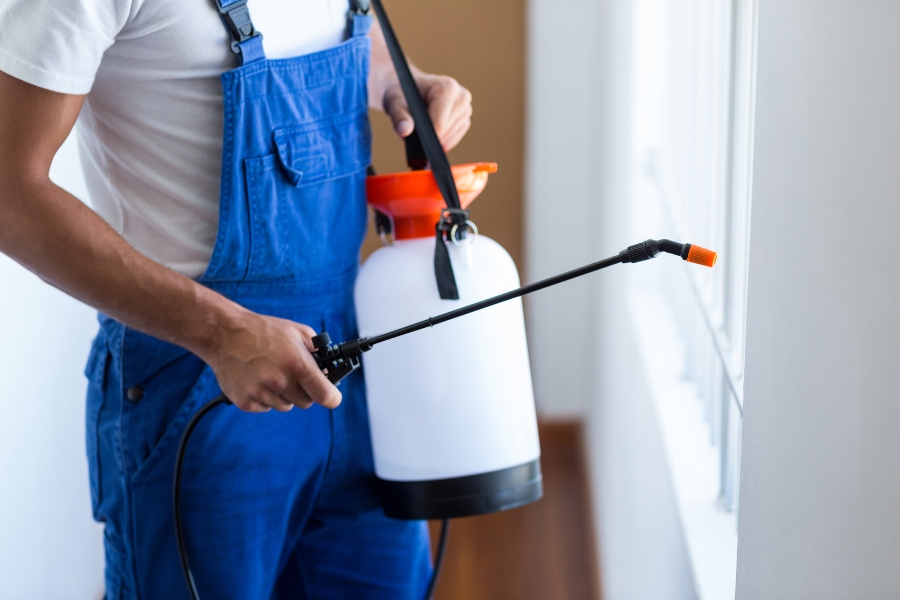Bid Farewell to Vermin: Pest Control Clovis Experts at Your Service
Wiki Article
Understanding the Numerous Techniques to Bug Control: A Comprehensive Guide

All-natural Insect Control Approaches
Utilizing environmentally friendly strategies such as companion planting and biological bug control is important for successfully taking care of pests in agricultural settings. Companion planting involves growing various plants in closeness to hinder parasites, boost nutrient uptake, and boost total plant health and wellness. Planting marigolds alongside tomatoes can aid repel nematodes. In a similar way, intercropping maize with beans can interfere with the reproduction patterns of insects like corn borers.Organic bug control involves presenting natural killers or microorganisms to control pest populaces. Ladybugs, for example, prey on aphids, managing their numbers without the need for chemical pesticides. An additional example is using Bacillus thuringiensis (Bt), a germs that targets specific insect bugs while being harmless to people, animals, and valuable bugs.
These eco-friendly techniques not only minimize the reliance on synthetic chemicals however additionally assist maintain biodiversity and soil health. By integrating natural bug control techniques into agricultural techniques, farmers can accomplish sustainable bug management while lessening negative influence on the atmosphere.

Chemical Insect Control Solutions
Along with all-natural pest control techniques, the use of chemical parasite control services plays a substantial duty in efficiently handling pest populaces in farming settings. Chemical pest control services are developed to target certain parasites that might create comprehensive damage to plants. These options often contain synthetic pesticides that are developed to eliminate bugs promptly and efficiently.Among the key advantages of chemical insect control options is their efficiency in regulating parasite infestations on a large scale. Farmers can apply these solutions using various techniques such as splashing, fumigation, or seed treatment to protect their crops from damaging bugs, weeds, and illness. Furthermore, chemical insect control solutions are relatively easy to apply and can supply quick results, helping farmers protect their yields and reduce economic losses.
Nonetheless, it is necessary to make use of chemical bug control services judiciously to decrease prospective adverse effects on the environment, non-target microorganisms, and human wellness. Proper application techniques, adherence to security guidelines, and regular monitoring are essential to make sure the responsible use of chemical insect control remedies in farming techniques.
Biological Insect Control Approaches
Biological insect control approaches take advantage of all-natural killers or microorganisms to take care of insect populaces in farming settings efficiently. This method offers a sustainable and green solution to pest administration, reducing the reliance on synthetic chemicals and decreasing harm to the atmosphere. One usual organic control method is the intro of all-natural adversaries, such as ladybugs or parasitic wasps, to target particular bugs. These killers feed on the insects, assisting to regulate their populaces naturally - pest control clovis.An additional organic control approach entails making use of virus like microorganisms, infections, or fungis to infect and kill pests. These microbial agents can be splashed on plants or presented right into the soil to fight various pests without harming advantageous insects or various other wild animals. In addition, the usage of pheromones to disrupt the mating patterns of parasites is an additional efficient biological control technique. By hindering their recreation, this approach assists to lower parasite populaces without the requirement for chemical intervention. On the whole, organic insect control methods offer a lasting and targeted service to pest management in farming.
Integrated Insect Administration (IPM)
Integrated Insect Monitoring (IPM) is a detailed approach that integrates various bug control strategies to properly manage and lessen pest populaces in agricultural systems. IPM concentrates on long-term prevention of bugs through a combination of organic, social, physical, and chemical control methods. By incorporating these various approaches, IPM intends to lower reliance on chemical pesticides, lessen ecological impact, and promote sustainable parasite management practices.
One secret facet of IPM is making use of biological Check Out Your URL controls such as natural killers, bloodsuckers, and virus to regulate insect populaces. This approach uses the power of nature to maintain a balance between bugs and their all-natural adversaries without creating harm to the environment.
Furthermore, IPM includes social methods like plant turning, hygiene, and environment control to produce undesirable conditions for insects and disrupt their life cycles. Physical controls such as obstacles, catches, and composts are also utilized to avoid pest infestations.
Mechanical and Physical Pest Control Techniques
Making use of non-chemical approaches, such as physical and mechanical insect control techniques, is a critical facet of detailed bug administration strategies, building on the structure of Integrated Insect Management's all natural strategy. Mechanical bug control includes the use of physical obstacles or traps to stop insects from accessing and harming plants or structures. This method can consist of methods like installing displays on windows, making use of row covers in farming, or employing sticky catches to catch pests.Physical bug control methods, on the various other hand, focus on directly removing bugs through physical methods. Making use of warm therapies to eliminate bed pests or vacuuming up bugs like ants or spiders can be reliable ways to take care of infestations without the usage of chemicals. By integrating these physical and mechanical bug control strategies into an Integrated Parasite Management strategy, specialists and individuals can decrease dependence on chemicals while still successfully minimizing and handling pop over to this site pest populaces damages.
Conclusion

In addition to all-natural bug control methods, the utilization of chemical bug control services plays a significant duty in successfully managing pest populaces in agricultural environments.One of the crucial advantages of chemical parasite control options is their effectiveness in regulating insect problems on a big range.Integrated Insect Management (IPM) is a detailed approach that incorporates various parasite control techniques to properly handle and decrease pest populations in farming systems.Utilizing non-chemical techniques, such as mechanical and physical insect control strategies, is an important facet of thorough insect monitoring strategies, developing upon the structure of Integrated Pest Administration's all natural approach. By integrating these physical and mechanical pest control methods right into an Integrated Pest Administration strategy, people and professionals can lower reliance on pesticides while still successfully reducing and handling pest populaces damages.
Report this wiki page